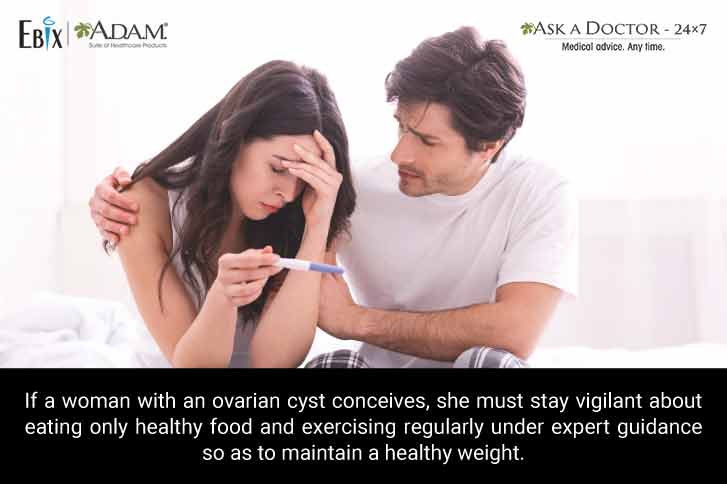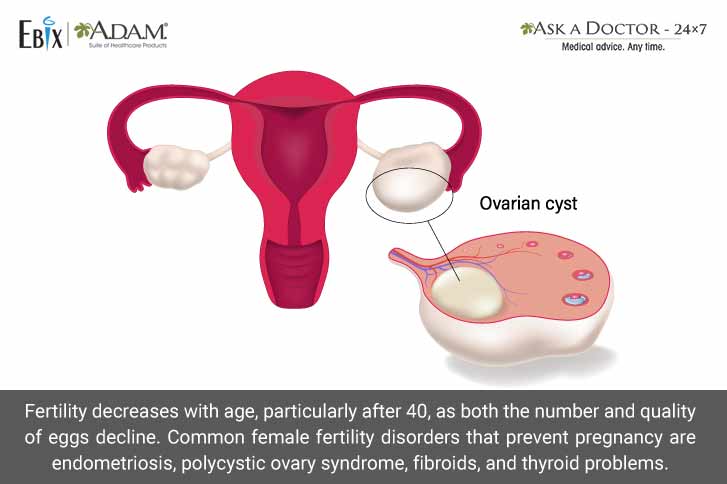Can Ovarian Cysts Affect Your Chances Of Getting Pregnant? Know The Facts
In ovulating women, ovarian cysts are highly prevalent, but most women won’t even know. Relatively, ovarian cysts are harmless and are a natural part of your reproductive cycle. However, in certain cases, the cyst may indicate an underlying problem that makes conception difficult.
Here is everything you need to know about ovarian cysts and fertility.
What is an Ovarian Cyst?
Your ovaries are a pair of oval-shaped reproductive organs that sit on either side of your womb (uterus). They are in charge of creating the hormones and eggs that either cause fertilization and pregnancy or flush out monthly with your period.
Ovarian cysts are fluid-filled sacs that affect either one or both of your ovaries at the same time. About 10 out of every 100 women are thought to have ovarian cysts. Usually, ovarian cysts are asymptomatic, and most women are unaware that they have one. They can only be found during routine pelvic examinations or ultrasounds. Usually, ovarian cysts don’t pose any problem until they increase in size. They are typically benign (non-cancerous) and often spontaneously resolve, rarely requiring surgeries.
Consult your gynecologist, if you have a dull pain in your lower abdomen most of the time, as it is one of the signs of an ovarian cyst. Ask for an urgent appointment, If you:
- Experience severe pelvic pain (pain in the lower abdomen).
- Experience nausea, vomiting, along with abdomen pain.
Can an Ovarian Cyst Stop You From Having a Baby?

If you’ve been diagnosed with ovarian cysts and are trying to conceive, you should know that mostly, ovarian cysts do not affect fertility or make it difficult to conceive. However, ovarian cysts can be a sign of underlying conditions such as polycystic ovary syndrome (PCOS) in which there are several small cysts on the ovaries or endometriosis in which uterine tissue grows outside of the womb. Yes, both these conditions have an impact on fertility and are associated with fertility problems.
Underlying Conditions that Can Affect Fertility in Women with Ovarian Cysts
There are a few undiagnosed underlying health conditions that may affect fertility in women with ovarian cysts. Some of them are enlisted below:
Ovarian cysts due to polycystic ovary syndrome (PCOS)
Polycystic ovary syndrome (PCOS) is a hormonal imbalance disorder in which your ovaries produce an excess of the male hormone ‘androgen.’ This causes an imbalance of your reproductive hormones. In PCOS ovaries become enlarged with multiple clusters of small cysts on the outer edges causing irregular ovulation and irregular menstrual cycle. These cysts make it hard to get pregnant due to the presence of high levels of the male hormone androgen which prevents the development and release of mature eggs (ovulation). And, due to the absence of a developed egg, neither ovulation nor pregnancy can occur.
PCOS is not only the leading cause of infertility in women but also poses a higher risk of developing complications during pregnancy. However, by managing the symptoms, women with PCOS can conceive and have healthy children.
If you have an ovarian cyst resulting from PCOS and are worried about getting pregnant, it is important to speak with your doctor. Your doctor will discuss treatment options that could increase your likelihood of getting pregnant.
Ovarian cysts due to endometriosis
Endometriosis is a gynecologic disease in which tissues that line inside of the uterus (womb) known as endometrium grows outside of the uterus such as in your ovaries, in the tissue lining your pelvis, in the fallopian tube, etc. If this “misplaced” tissue is found in ovaries, it results in the formation of chocolate cysts, fluid-filled sacs of old blood. These cysts may cause the ovaries to stop functioning, which would prevent pregnancy. Painful periods and pain in your pelvis are common signs of endometriosis.
Endometriosis can increase the risk of:
- Infertility, making it harder to get pregnant
- Getting ovarian cancer
It is estimated that endometriosis affects approximately 10% to 15% of women of reproductive age.
You can consult Ask a Doctor 24x7 about treatment options that are available for endometriosis to help you achieve your fertility goals.
Ovarian cysts during pregnancy
Ovarian cysts are not an uncommon finding during pregnancy, and they pose a little health risk due to their small size. However, if these cysts continue to grow with your pregnancy, they may increase the risk of cyst rupture, twist, hemorrhage of the cyst, or can cause problems during childbirth. In such situations, the cyst would be closely monitored by your obstetrician/gynecologist through ultrasonography throughout your pregnancy.
You can also talk with OB/GYN online to know about the risk of ovarian cysts and potential treatment options to help you have the healthiest pregnancy possible.
Conclusion

The crux is not all ovarian cysts are the same. Most of them are harmless and do not interfere with fertility/pregnancy; instead, many a time doctors have observed that women may never have any symptoms of it, and the undiagnosed cysts may disappear over time.
On the other hand, some ovarian cysts can cause fertility issues like those caused due to endometriosis and polycystic ovary syndrome. Your doctors will assess the size and characteristics of your cysts, evaluate symptoms, and will start appropriate treatment considering your medical history. If these cysts are treated on time, the chances of pregnancy are improved. If you have any questions related to ovarian cysts, you can Ask a Gynecologist online, anytime.
Recently Answered Questions Related to Ovary Cyst and PCOD
Ask a Specialist
Recent Questions


